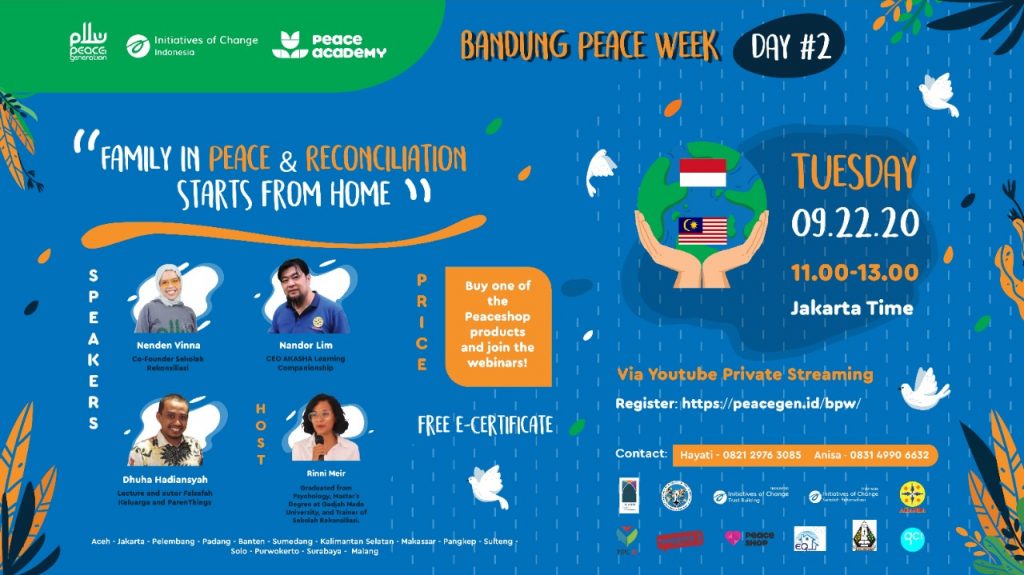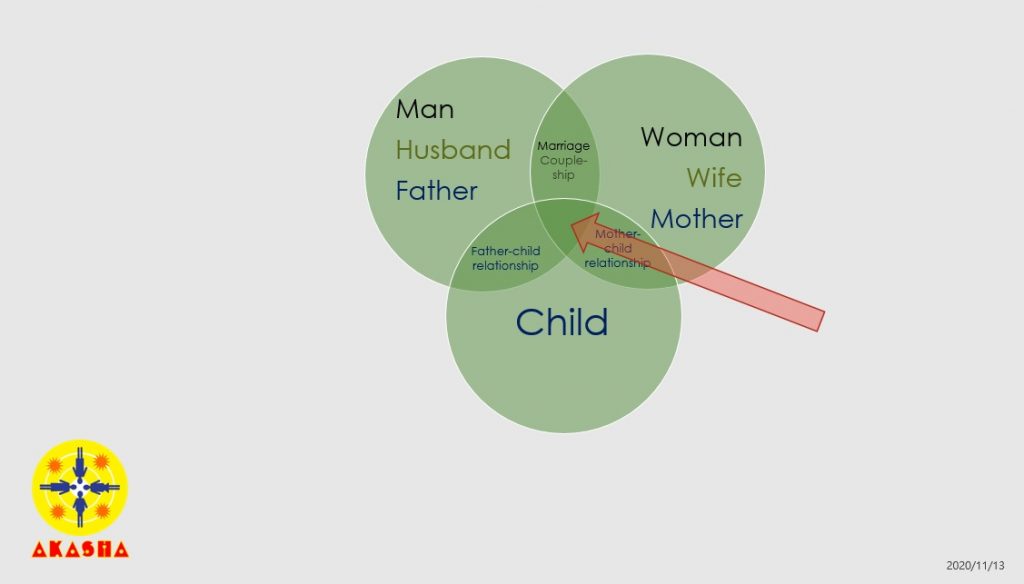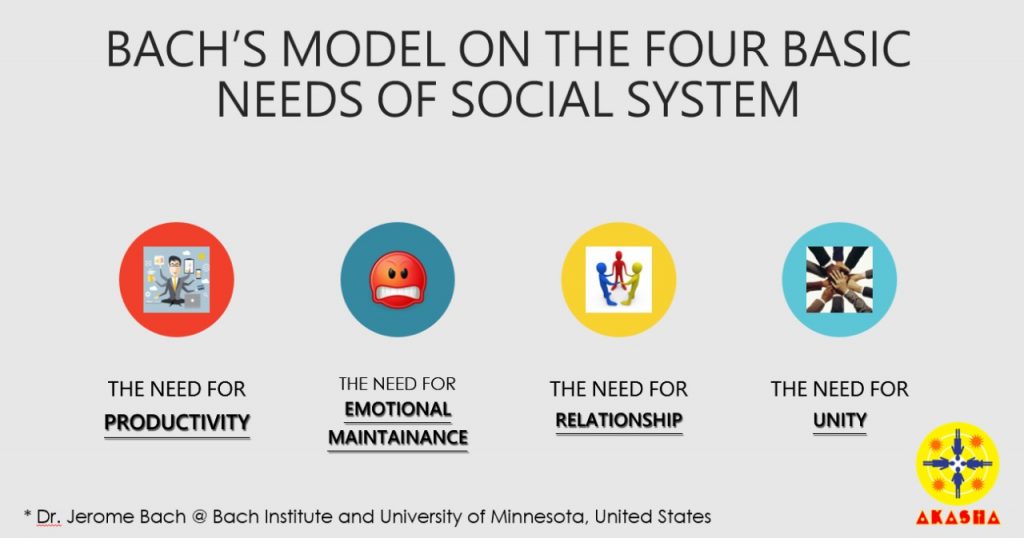
On the second day of BPW was about how peace works should start from home. There are 3 speakers who have been working in this field for years. They will be speaking their personal experience and learnings from their works.
First, Nenden was the initiator of School of Reconciliation (SR) and CEO Media Damai Indonesia. SR is not a formal school, this is such a support system, the community, the place to support people to find their purpose, to be real with themselves.
Nenden was coming from dysfunctional family. She didn’t have any company/friends, she felt lonely, then she asked this question, “What happen in my life? why am I living without peace and happiness? Very traumatic, and a lot of anger inside me”. In her reflection, she found that the anger is actually to her parents and to herself. The parents got divorced, they did not give a good life for her. She thought, she needed to find the answers from the unhappy life she had. After learning it from Nandor, she thought, she already reconciled with her family especially with her mom, but she realized that the anger was still there inside her, but this was different. Nenden felt uncomfortable, feeling guilty when she needed to work leaving her son, then she asked her Guru. He told me, “Please forgive your mom without explanation”. The forgiveness without explaining.
So she forgave her mom with the true love, without explaining. True love is loving somebody else just the way they are. True love is not stick, no controlling. She learned more about the word cathexis. Cathexis is a love that controlled people. So she does not want to do it any more. Then she started to release all this cathexis to the people surround, instead starting the true love.
She felt that what she is doing in SR is very important, she wants to spread hope to people that even we are coming from dysfunctional family, we still can fix things.
—
Second speaker is Dhuha. Dhuha was also the trainer of Sekolah Rekonsiliasi. He wrote 2 books; Falsafah Keluarga and Pareng-things. Dhuha started from where we learned how to build relationship? The way we deal with situation is largely determined by two things:
- The ability of our brain to process information. This ability is determined by gens given by our parents.
- Bad experiences in the past. Mostly our bad experiences closely related to parenting or our parents.
60-70% birth are unwanted, so mostly all of us here are unwanted child. Eventually when we are unloved we will have a hard time to love ourselves and others. And this continues to any kind of relationship. So any baby born with unloved will carry the toxic or shame until adulthood. This shame will apply to any other relation like parent-children, neighbor, race-race, nation-nation.
From this reality, he believes that peace should start from family. Then he got the call to be the trainer in SR.
—
The last speaker is Nandor from Malaysia. Nandor is the initiator of AKASHA, trainer of life. The topic of family in peace and reconciliation was something that he began this learning that he chased what peace is in his young age. He lived in a lot chaotic not in a peaceful mind. Then he destructed his past life instead of construct the life. He did not have a good friendship, he didn’t perform well in the job, he became part of the problem of the society, he did not know how to make it correct. Then he met a group of people that talked about change, the he started to think he wanted to become a solution of the society. And this change should start from “me”. Then he took a long reflection on this, and he came to realization that “If I want to be the change, I first need to own and know what is my problem”. He asked him self, “What kind of person he was?” he was very anger, irresponsible, running away from his issues. And this realization was the point that he wanted to fix his life and it was the start of his journey of getting to know who he is better.
His origin is Chinese, but he is Malaysian. He has been giving the service to Chinese Malaysia. Along with his works in this learning, he discovered that the family issue is borderless issue, it does not only happen in Chinese family but also to human being’ life regardless the colors, religions, races, countries, and gap generations, because we all come from family.
From what his reflection on the past life, he thought that life or marriage was so hard, he did jealousy to all people who have a good family, family who are able to shared good things to each other, however he did not take any action on his own, and then he started to reconcile with his mom and also with his father later on.
He had the first step to learn how they brought up without any prejudices, he was trying to be a person who more acceptable, and lovable. Off course it was not easy for him as he did have this model of life or he did not get used to/trained to live like this.
He learned that the prosecutors were actually the victims, those who judged, have been judged by others. Knowing his parents is the first help, whatever had been given from his parents was the best they could give/provide. He went to all the suffering was a truth, and what the parents already had given him was not purposely to hurt him was also a truth, so how to combine these two truths needs the systematic and constructive thinking to shift the relationship from the very bad position to a more positive position.
The process of reconciliation between Nandor and his mom is still have a great journey to go through and a lot of space to improve. – He continued the sharing from his power point presentation as follows:
Family in unpeaceful and unreconciled mode considers as family systems dysfunctional.
Family systems become chronically dysfunctional not because of bad people, but because of bad information loops, bad feedbacks in the form of bad rules of behaviour.

If the marriage is functional, the children have a good chance of being fully functional. If the marriage component is dysfunctional, the family members are stressed and tend to adapt dysfunctional.
MARRIAGE IN PEACE = FAMILY IN PEACE
HOW AN UNPEACEFUL MARRIAGE BUILDS AN UNPEACEFUL FAMILY?
The family needs:
A sense of worth
A sense of physical security or productivity
A sense of intimacy and relatedness
A sense of unified structure
A sense of responsibility
A sense of challenge and stimulation
A sense of joy and affirmation
A sense of a spiritual grounding
A family needs a mother or father who are committed in a basically healthy relationship and who are secure enough to parent their children without contamination.

Four steps of reconciliation the in family:
Step 1: Learn to understand that I am part of the problem
Step 2: Learn to confront to the problem
Step 3: Learn to deal with the problem
Step 4: Learn to repeatedly exercise the above three steps in lives
Finally, he closed his presentation with this quote:
If I want to see peace in the world, I first see peace in my family;
If I want to see peace in my family, I first see peace in myself.
-Hayati
